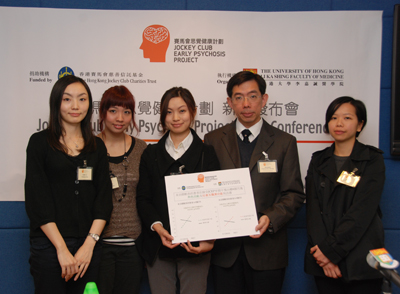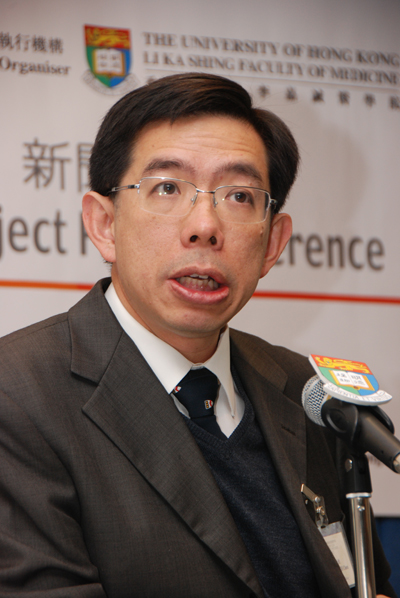Latest results from the Jockey Club Early Psychosis (JCEP) Project JCEP Early Intervention Treatment Improves Outcome in Early Psychosis Patients: JCEP Project 6-month Early Outcome Data
17 Feb 2011
Psychosis is a common condition affecting up to 2 in 100 people. Evidence suggests that delayed treatment may lead to poorer outcome, while specialised early intervention treatment may improve outcome by early detection and focused intervention. Reviewing the first set of initial 6-month data on the psychosis patients receiving specialised early intervention (EI) treatment from the Jockey Club Early Psychosis (JCEP) Project (refer to "JCEP EI treatment" in subsequent discourse). The researchers from the Department of Psychiatry of The University of Hong Kong Li Ka Shing Faculty of Medicine found that compared with the standard treatment, JCEP EI treatment is effective in improving social and occupational functioning (such as work productivity, independent living, establishing immediate and extended social networks relationships) of the patients. More importantly, the improvement is particularly significant among the patients with long duration of untreated psychosis (DUP, a.k.a. the difference in time between the appearance of symptom(s) and the first psychiatric treatment).
Professor Eric Chen Yu-hai, Project Director of JCEP and Professor at the Department of Psychiatry, The University of Hong Kong Li Ka Shing Faculty of Medicine says the results of the study provide strong scientific evidence for the efficacy of EI treatment as early as 6 months after the patients receiving it. He says, "The data show that the specialised EI treatment designed by JCEP significantly improves various social and occupational functioning of psychosis patients especially for those with DUP as long as three months or above. The JCEP EI treatment will probably be an ideal model for HK to develop as standard treatment. Long term data is needed to fully evaluate the impacts over a longer period of time."
Methodology
In JCEP, patients are randomly allocated to receive either standard psychiatric treatment from Hospital Authority's outpatient clinics, or standard treatment with the addition of JCEP EI treatment (specifically designed psychological intervention for adult early psychosis patients, lasting for up to 4 years). In this study, the first batch of 123 patients have completed the first 6-month assessments and their social and occupational functioning, symptoms, and cognition are measured and examined.
About Early Intervention treatment offered by JCEP
For each patient from the group receiving both standard treatment and JCEP EI treatment, a JCEP Intervention Officer is assigned to provide necessary aids. These JCEP Intervention Officers possess psychology and social work background. They had received intensive training and acquired specialised knowledge in early psychosis. The intervention provided by these officers is guided by in-depth psychological formulation and planned longitudinally according to the patient’s illness stage. Various types of treatments are available which cater for different needs of each patient, such as cognitive-behavioral therapy, psychoeducation, crisis intervention and life coaching.
Major Findings
From the JCEP Project 6-month early outcome data, the HKU research team found that amongst patients with longer DUP (over 3 months), those who received JCEP EI treatment showed significantly larger improvements in two independent measures of functioning: (1) Role Functioning Scale (RFS) which assesses one's work productivity, independent living, self care, immediate and extended social network relationships; and (2) Social and Occupational Functioning Assessment Scale (SOFAS). The performance of these patients in terms of functioning goes up to a satisfactory level - from marginally functioning at baseline (i.e. when they are first admitted to JCEP and receive no treatment yet) to moderately functioning at 6-month. On the other hand, the performance of the patients with longer DUP who receive only standard treatment did not improve.
In addition, the assessment also shows that patients with JCEP EI treatment have better cognitive function, such as in the digit symbol test, than patients without EI. This shows that JCEP EI treatment is also effective in improving patients' cognitive function. At the same time, we found that cognitive function is correlated with functional outcome, supporting the possibility that better cognitive function may lead to better functioning.
Study Implications
The impact of JCEP EI treatment is becoming detectable as early as within a 6-month period. The first 6-month assessment results have proven the effectiveness of EI in addressing functional impairments caused by psychosis, particularly for patients with longer treatment delay, as they started treatment with worse levels of symptoms, functioning and cognition.
To conclude, Professor Eric Chen Yu-hai remarks, "The research data tells us that it is important for psychosis patients to seek specialised help early as it is associated with less functioning decline. Long term course of the disorder appears to be largely determined in the first few years, hence intensive and specialised early intervention should be provided to adult early psychosis patients." Given that the current analysis is derived from data collected in 6 months, Professor Chen adds that long term data is needed to fully evaluate the impacts over a longer period of time. He also cautions that before generalizing the results to other services, it is important that comparable quality of staff training, intervention content, and service delivery are ensured.
About Psychosis
Psychosis refers to a set of symptoms that include hallucinations, delusions, and disorganised thoughts and speech. It is a psychological and physiological condition related to an imbalance in certain chemicals in the brain called ’neurotransmitters’. Multiple aspects of a person’s life can be affected by this condition, including subjective experience, wellbeing, motivation, contact with reality, and functioning. Symptoms can usually be effectively controlled by medications but more extensive psychological intervention is required to assure optimal outcome.
About JCEP Project
The Hong Kong Jockey Club Charities Trust has donated around HK$69 million for the Department of Psychiatry, The University of Hong Kong Li Ka Shing Faculty of Medicine to lead the JCEP Project in collaboration with Hospital Authority, Caritas‐Hong Kong and the Mental Health Association of Hong Kong. A multi‐disciplinary team, comprising intervention staff and researchers, has been set up to serve early psychosis patients aged over 25. Patients will receive individualised, phase‐specific intervention services in the first two to four years after their first episode of psychosis. The team will provide specialised case management and psycho‐social interventions by engaging the patients through home visits, phone contact, web‐based communication and tracking system. Support for affected families will also be offered to help patients attain a full functional recovery. To date, 318 patients have participated in the JCEP Project.
To use the press release photo(s) for any publishing, publicity and related purpose, photo courtesy should be given to “Li Ka Shing Faculty of Medicine, The University of Hong Kong”

(From left) Ms Ranee Choi and Ms Peggy Chan, Jockey Club Early Psychosis Project (JCEP) Case Intervention Officers; Dr Christy Hui Lai-ming, JCEP Chief Research Officer; Professor Eric Chen Yu-hai, JCEP Project Director and Professor, Department of Psychiatry, The University of Hong Kong Li Ka Shing Faculty of Medicine and Ms Wendy Tam, JCEP Chief Administrative Officer, introduce the study results of the impacts of early intervention treatment on early psychosis patients.

Professor Eric Chen Yu-hai, Project Director, Jockey Club Early Psychosis Project and Professor, Department of Psychiatry, The University of Hong Kong Li Ka Shing Faculty of Medicine says the data show that the specialised early intervention designed by JCEP significantly improves social and occupational functioning of psychosis patients.

Dr Christy Hui Lai-ming, Chief Research Officer, Jockey Club Early Psychosis Project explains the objectves of the early intervention treatment.

(From left) JCEP Case Intervention Officers Ms Ranee Choi and Ms Peggy Chan share their experience on executing the early intervention service.
